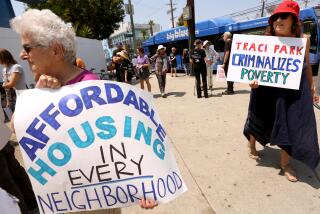SOS Sends the Message: The Poor <i> Are </i> in Our Back Yard
- Share via
The poor are not like us. Or so many of us like to think.
The poor, I hear, bring crime and trash to otherwise pristine neighborhoods, places with lawns and driveways and sliding glass doors around the back.
The poor lurk, it is said. They spread fear.
The charities who try to help them--as opposed to us --can make things worse, I’ve also heard it said. They attract all sorts of people, the down-and-out from someplace else. They bring noise and traffic; they make a mess.
These are arguments that many have made about Costa Mesa’s Share Our Selves and its poor clients, about 20,000 of them a month.
Some of the complaints have a ring of truth, others of ignorance, and still others of bigotry and rage.
Still, the arguments seem always the same. Someone has even come up with a catchall name. The NIMBY syndrome, they call it: Not In My Back Yard.
So SOS, after months of City Council hearings, has been ordered to move out of a city-owned building in a neighborhood on Costa Mesa’s west side. The charity hopes to buy its new place in an industrial area dotted with structures of concrete and glass. They just received an official, albeit temporary, city OK.
Condo owners in Newport Beach are appealing, however, and so are residents of a Costa Mesa trailer park nearby. And now the Costa Mesa Chamber of Commerce has added its own nay to the seemingly endless fray.
“SOS is a worthwhile organization,” said chamber President Russell Gilbert, “but if you hurt business, you increase the ranks of poor and unemployed.”
From the start, of course, people-getting-hurt has been this dilemma’s overriding theme. The City Council has been asked, over and over again, to decide. Will it be our needs or theirs? Who counts for more and where do we draw the line?
SOS has got a good heart, is what many people say. Somebody really should help these people out.
Even the Costa Mesa Chamber of Commerce has honored Jean Forbath, the SOS director, as its Woman of the Year. Forbath is a fighter, was the message there--someone to admire, a woman with a lot of goodness and guts.
Except now the fine print has come to light. NIMBY, Jean, the chamber says. We are sure you will understand.
Many of us are uncomfortable with diversity, and in this, I believe, much of the NIMBY problem lies.
We’ve been raised like this, most of us, living among our own kind. Our friends, for the most part, share the same views. Many find it unpleasant to spend much time with those of a different ilk.
The other day the news media reported some jolting statistics courtesy of the Sentencing Project, a nonprofit group in Washington that has analyzed Justice Department crime data.
One out of every four of this nation’s black men, ages 20 to 29, are either in prison, on parole or on probation, the group said. That compares with one out of 10 Latinos, and one out of 16 whites.
Poverty, isolation and neglect are primarily to blame.
“We now risk the possibility of writing off an entire generation of black men from leading productive lives,” said Marc Mauer, the author of the report. “We really don’t know what it will mean for the future because we have never had a situation like this before.”
And earlier this year, the New England Journal of Medicine published a study comparing the longevity of men in Harlem with men in Bangladesh. They live longer in Bangladesh.
Women in this New York City neighborhood live a little longer than those in Bangladesh, but only because fewer girls make it to the age of 5 in Bangladesh.
Both of these studies, certainly, make for shocking headlines. I find them both hard to erase from my mind.
Surely politicians, academics, social workers, physicians and anyone else with a conscience, will mull them over and heads will move, slowly, from side to side. People will say how appalled they are. Can’t something be done?
Harlem, of course, might as well be Bangladesh for most of us here. About 96% of its population is black, and 41% live below the poverty line. The people of Harlem die slow deaths from drink and drugs, or much more quickly, in violent bursts of pain.
Orange County is one of the most affluent areas in the nation. This is what we boast about to those who live outside. And nobody, as far as I know, has thought to compare our pockets of squalor with those of the Third World.
If they tried, we would tell them to concentrate on Harlem, or South Central Los Angeles, or Chicago’s South Side. In comparison, the poor in Orange County are hardly worth mentioning. So we usually don’t.
Yet SOS is an exception, feisty and loud. This charity knows that poverty is not just somebody else’s problem, in Harlem or in South-Central L.A., but one in which we all, ultimately, will share.
By sharing ourselves, maybe we can save ourselves, too.
Dianne Klein’s column appears Wednesday, Friday and Sunday. Readers may reach Klein by writing to her at The Times Orange County Edition, 1375 Sunflower Ave., Costa Mesa, Calif. 92626, or calling (714) 966-7406.
More to Read
Sign up for Essential California
The most important California stories and recommendations in your inbox every morning.
You may occasionally receive promotional content from the Los Angeles Times.













